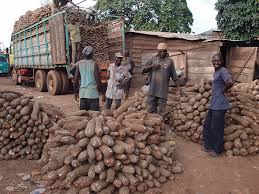Prof. Lateef Sanni, Executive Director, Nigerian Stored Produced and Research Institute (NSPRI) has described the nation’s yam value chain as a gold mine waiting to be harnessed.
Sanni said this in an interview with the News Agency of Nigeria (NAN) on Thursday in Lagos.
He said if farmers could convert raw yam to different processed products, it would yield more profit for them.
“My take as a post harvest expert in Africa is that we do not need to take our yam to Europe and all other markets without being processed.
“Why will Nigeria not convert yam into yam flour, pando yam, flakes and fries, just like the French fries when we have the technology and experts in this country.
“Why are we adamant on exporting yam raw because Ghana is doing it. How much money will they make from that?
“The yam value chain is a gold mine in the country, and the more we convert yam to different products, the better for everyone of us.”
Sanni noted that there was need for stakeholders in the value chain to come together and restudy the sector in order to triple its income.
He said multiple registration and delay in exporting the product at the seaport had contributed to yam produced in Nigeria being rejected in foreign markets.
He said, “we need to come together and restudy the yam value chain and see the area where if we torch on it, will triple income for Nigerians.
“Definitely not yam as tuber; the return on the investment will be very small.
“The red tape at our ports, different registration points, different regulating points, multiple registrations and delay in export will cause rise in temperature on yam and it will lead to sprouting.
“The climate change that we are currently having now is a reality.
“When you do not expect the temperature to rise, it will rise, when you do not expect temperature to be low it will be low. It is going to affect these activities.”
The professor noted that countries like Ghana excelled in yam exportation because they had smooth supply and distribution chain.
“In Ghana, when they finish all these processes and the are ready to containerise everything, they ship it immediately. They have a very smooth supply and distribution chain and they follow it up to Europe.
“The European Fortified Good Agricultural Practices (EUROGAP) training that we are supposed to do with our farmers in Nigeria, how many farmers can afford it?
“How many certified agents do we have in Nigeria that are doing the training, and even if I want to do the training, how many people are willing to pay me?” he asked.
The executive director called for synergy between research institutions and value chain actors, adding that government alone could not transform the sector.
“The actors need to come together, government alone cannot do these things, government is to enable the business environment.
READ ALSO:
- AGF vows to maintain core values, accounting concept with ICAN
- Former FCT minister, Jeremiah Useni, is dead
- Do2dtun Bows Out Of Radio In Style After 20 Years
- Speed Darlington Breaks Silence After Release, Sends Note Of Warning
- Financial Adviser Geh Geh Splashes Millions On Brand New G-Wagon
“That is why the Minister of Agriculture and Food Security is making sure we do the right thing, but as regards zero reject of agricultural produce, it is more of a private sector intervention.
“The federal ministry of agriculture and food security has a unit on zero reject, they have standard operating procedures, but our nature and attitude need to change,” he said.
He urged yam value chain actors to come together and be led by the private sector in creating awareness and surveillance system that would bring about the desired change. (NAN)


